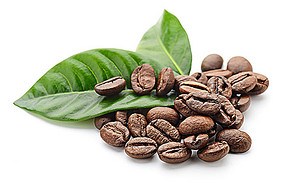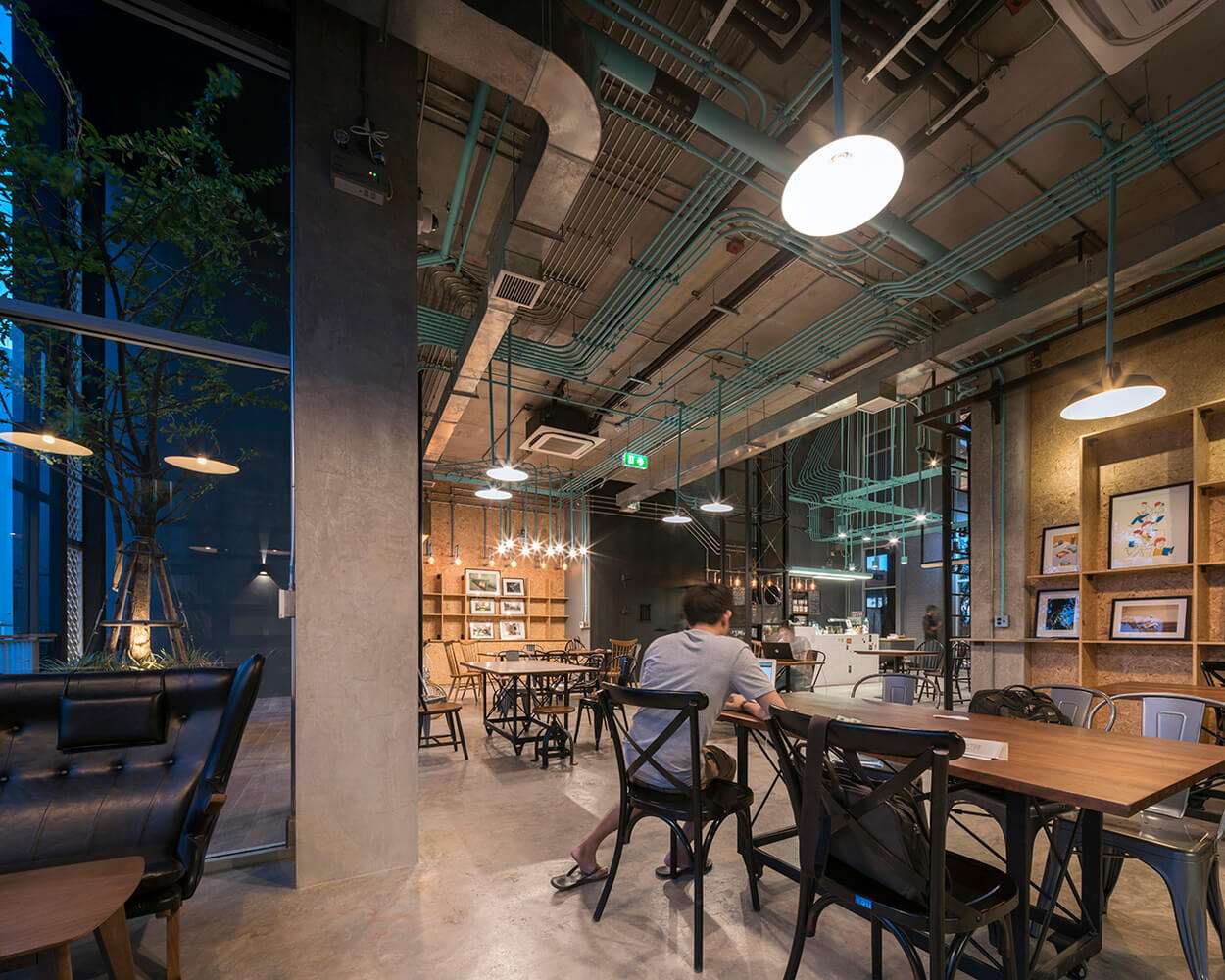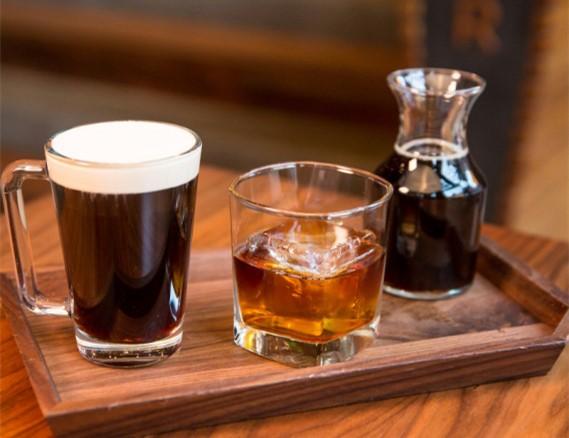Six factors affecting the taste of coffee
Follow the caf é (Wechat official account vdailycom) and found that Beautiful Cafe opened a small shop of its own.
From a bean to a cup of coffee, its life has gone through screening, drying, baking, grinding and extraction. There are many factors that affect it, and there are many reasons for the subtle taste. Today, we mainly explore some factors that affect the taste of coffee, which not only benefit the body, but also make the taste buds enjoy.

1 effect of roasting of coffee beans on taste
Coffee roasting is that raw coffee beans remove excess water from coffee beans after roasting at a certain temperature, and some components in coffee beans are transformed into caramelized sugar and flavor oils. Roasting is a necessary stage for coffee beans to produce flavor. The flavor substances in coffee must be roasted in order to show their characteristics.
Roasting is the most difficult link in coffee technology. Good roasting can give coffee beans a second life, coruscate new vitality and show their greatest brilliance.
The degree of roasting is generally divided into four degrees: shallow, medium, deep and heavy. Shallow roasting can obviously show the acidity of coffee, and deeper roasting will further explore the sweetness and deeper taste of coffee. At the same time, with the deepening of roasting, the sour taste will be more lost and the bitterness will be more formed, while to the deepest French roasting, there are only bitter carbonized beans without sour taste.
Baking is a thermal reaction that takes place completely within 15 minutes, and subtle taste changes take place every second with the change of heat and time in the baking process, so you can master the baking just right in order to maximize the personality of coffee beans.
2 the effect of grinding on the taste of coffee
Grinding is the process of using tools to form small particles or even powders of coffee beans. Roasted coffee beans are ground to form fine powder. the size of coffee particles is related to the extraction of soluble and volatile substances, and the particle size depends on the characteristics of the relevant equipment and operation techniques used in grinding coffee.
The common coffee bean grinder is to squeeze and crush coffee beans through two rotating knives. there are two kinds of grinding blades: cone type and disc type.
The degree of grinding refers to the ratio of the increase of the total surface area of coffee beans to the surface area of the original coffee beans. When the surface area of the original coffee bean is constant, the grinding degree of the coffee bean can be divided into rough grinding, medium grinding and fine grinding according to the size of the grinding particles. The grinding degree has a great influence on the selection of coffee extraction methods and the flavor and taste of coffee products.
3 effect of coffee freshness on taste
The freshness of coffee beans. The flavor of roasted coffee beans is fully revealed after 48 hours, and it is the best time for its flavor within a week.
With the passage of time, the aromatic molecules in coffee beans continue to volatilize and absorb the peculiar smell in the air, the flavor of coffee beans will be gradually lost, and after a month, the flavor has been basically lost, only bitterness and bad taste remaining.
4 effects of water quality and temperature on taste
Water, 98% of a cup of coffee is water. The quality and temperature of water affect the taste of coffee to some extent.
In general, the trace elements contained in tap water or mineral water will react with the substances in coffee to affect the taste of coffee, and the excellent water quality will also have a bad effect on the taste of coffee, so pure water should be used in coffee extraction. Secondly, about the water temperature: the most suitable water temperature for coffee extraction is between 89Met 93 degrees. Too high temperature will increase the bitterness of coffee, while too low temperature will make coffee too sour.
5 effect of extraction on taste
Brewing coffee is a complex science, even if the same raw material is used each time, the same roasting and the same production process are used, the taste may be different in the end. If the brewing method is different, the taste and taste of the coffee will be different. Although the same raw materials are used to ensure the same amount of sour and bitter taste, if the degree of extraction is different, the taste of coffee will be different.
During extraction, the following factors affect the taste of coffee
◆◆◆
1. Water temperature (water temperature when in contact with coffee powder)
2. Time (contact time between water and coffee powder)
3. The size of coffee powder particles
1. The temperature of water can change the taste of coffee
When it comes to water temperature, people will immediately think of the temperature of the water poured into the extraction, but in fact, the water temperature here refers to the temperature of the water when in contact with coffee powder.
If the water temperature is too high, it will speed up the dissolving rate of coffee powder. The sour taste itself dissolves very quickly, and no matter how high the water temperature is, the total amount of it dissolved in water will not change much. If the water temperature is too high, the bitterness will move faster from the center of the coffee powder to the surface, the total amount of bitterness dissolved into the water will be more, and the proportion of bitterness in the coffee will increase. On the other hand, if the water temperature is low, the bitterness in the coffee will be reduced.
2. Extraction time can change the taste of coffee.
The dissolving rate of sour taste is already fast, so there is not much difference between the amount of acid dissolved in water in 3 minutes and that in 5 minutes. The dissolution rate of bitterness is slow, so the amount of bitterness dissolved in water in 3 minutes is quite different from that in 5 minutes. In short, if you increase the extraction time, the longer the time, the more bitter the coffee.
3. The size of coffee powder particles can change the taste of coffee.
The finer the coffee powder is ground, the easier it is to get the ingredients out. For the sour ingredients that are already easy to dissolve, the size of coffee powder particles has little effect on it. However, for bitter ingredients that are not easy to dissolve, the size of coffee powder particles is of great significance. The smaller the coffee powder particles, the greater the total amount of bitterness dissolved in the water and the greater the proportion of bitterness.
The influence of 6 people on taste
Baristas and coffee drinkers. The previous ones are all objective factors, but this one is relatively subjective. But believe it or not, technical factors aside, this cup of coffee tastes good only when a barista is confident, serious, and tries his best to make a cup of coffee.
And coffee drinkers, according to the mood, the degree of understanding of coffee is different, can feel the taste of coffee will be very different.
Important Notice :
前街咖啡 FrontStreet Coffee has moved to new addredd:
FrontStreet Coffee Address: 315,Donghua East Road,GuangZhou
Tel:020 38364473
- Prev

How to open a coffee franchise in a first-tier city?
Coffee franchise shops no matter where they go, there will be more or less leisure places, so coffee shops have gradually replaced fast food restaurants and become the preferred leisure place to kill time. The annual coffee franchise is always called one of the top ten investment projects. It is not very good to operate freely and drink coffee every day. So how to open a coffee franchise in a first-tier city? My turf coffee
- Next

Starbucks: a cup of whisky-flavored coffee
After a century of baptism, the increasingly skilled barrel aging has been a source of inspiration for chefs, from sugar and chocolate to sauces and apple juice. Today, whisky buckets give Starbucks coffee a distinctive flavor. The highly malleable combination of raw coffee and barrel aging seems to be not bad. Du of Starbucks Beverage Research and Development team
Related
- What is the difference between Indonesian Sumatra Mantinin coffee and gold Mantinin? How to distinguish between real and fake golden Mantelin coffee?
- What does bypass mean in coffee? Why can hand-brewed coffee and water make it better?
- Unexpected! Ruixing Telunsu lattes use a smoothie machine to foam milk?!
- % Arabia's first store in Henan opens into the village?! Netizen: Thought it was P's
- Does an authentic standard mocha coffee recipe use chocolate sauce or powder? Mocha Latte/Dirty Coffee/Salty Mocha Coffee Recipe Share!
- What is the difference between Vietnam egg coffee and Norway egg coffee? Hand-brewed single product coffee filter paper filter cloth filter flat solution!
- What is the difference between sun-cured and honey-treated coffee? What are the differences in the flavor characteristics of sun-honey coffee?
- How to make Italian latte! How much milk does a standard latte use/what should the ratio of coffee to milk be?
- How to make butter American/butter latte/butter Dirty coffee? Is hand-brewed coffee good with butter?
- Is Dirty the cold version of Australian White? What is the difference between dirty coffee/decent coffee and Australian white espresso?

